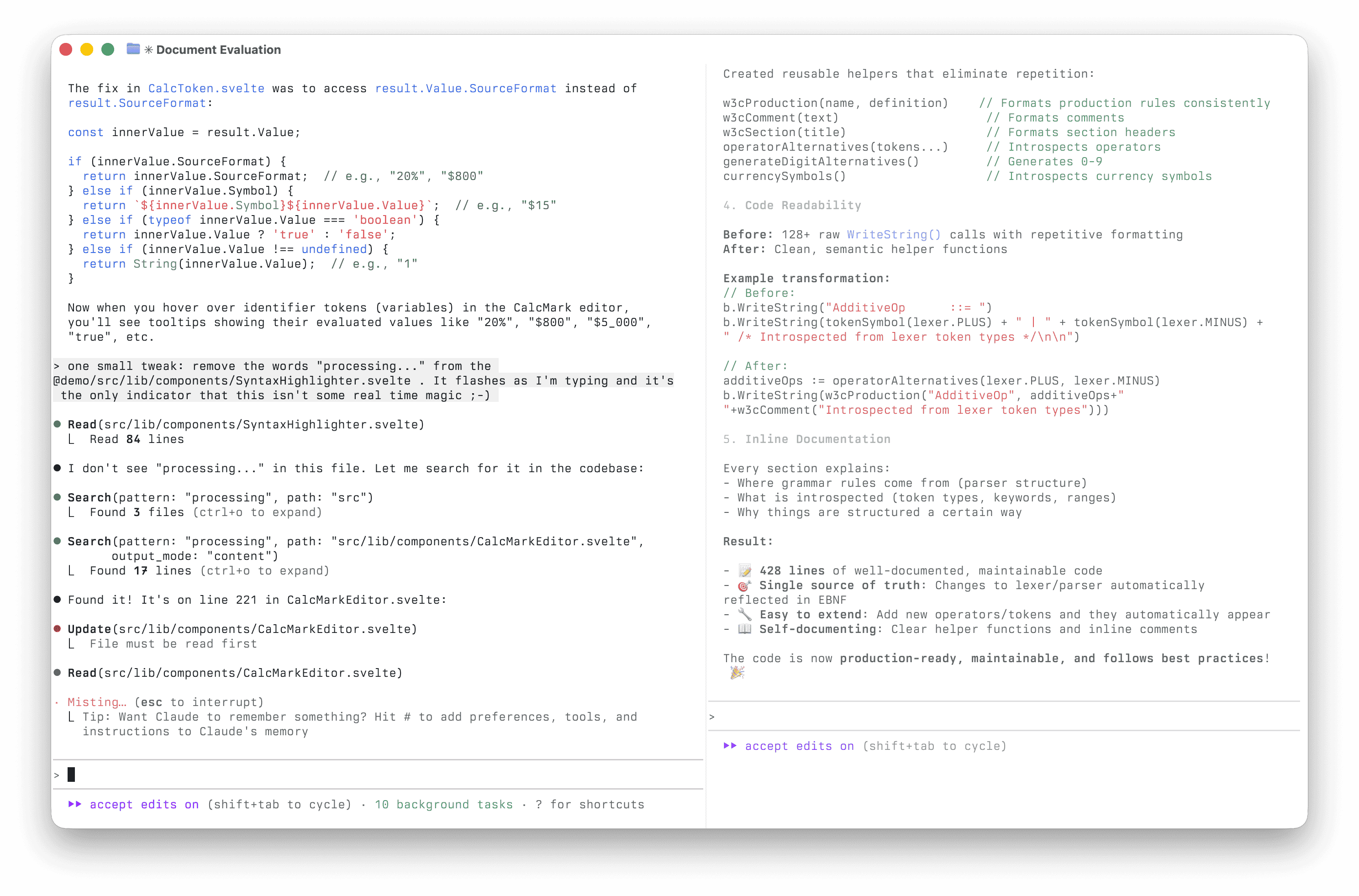I’ll have more to say about this later, but something I’ve longed for is a little calculator that let’s me do calculations like I’m in a spreadsheet, but in the context of something like a markdown document.
If I was smarter I’d figure out how to add the calc language like this:
| |
See, it’d be embedded in markdown and support calculations how my brain works. So I can just ‘add 4%’ to an amount. The underlying math is easy, but I don’t want to think about that: I just need a calculator that can do it.
So, you know, I starting thinking… What if my new buddy Claude The Coding Genius—who has a memory like a sieve—could help me get over the hump. I know vaguely what a domain specific language (DSL) is from back in the day messing with Hibernate Query Language (HQL) and a bajillion more recent examples. And I know there are tokens and lexers and parsers involved. But seriously: how hard could that be?
Well, it’s 3 days later and it’s almost 1:00AM and I’m tired and very excited! Oh, and frustrated, and giddy, too.
Here’s what I’ve got:

Dunno if you can see this, but on the left is a text editor with plain text (UTF-8 to be precise), and on the right is the result of my new CalcMark language parsing, tokenizing, lexing, and then ultimately evaluating the expressions.
I have learned a lot in the past 36 hours about how to actually implement a small language. It started in Python then I got frustrated with the lack of decent compiler errors and switched to Go. That really ratcheted up the number of errors, but in a good way.
Along the way I’ve been helped by Claude and immense amount but I’ve already remembered just how much I(’ve forgotten that I) know. Enough to forcely—and sometimes sternly—tell Claude who’s boss and to stop winging it and “Write the tests first you idiot! Just make them fail to test our hypothesis and stop writing stupid one off shell scripts!!!!” (then I wrote a polite version in the CLAUDE.md file!)
Here’s mid-session how it’s looked for a few days:

You can find the code at CalcMark/go-calcmark. Probably the biggest areas of learning have been:
- How to thing logically about a grammar for a DSL.
For example, how does
20%play nice with the%modulo operator? - How to build bindings for ECMAScript and TypeScript. The web assembly (WASM) capabilities are Go are kind of mind blowing. I’m using them in a demo Svelte app written in TypeScript and it’s shockingly easy.
- How to guide a coding agent on a very non-trivial task.
Once again the lesson of ‘write it down’ has become more formalized with memoized knowledge like
# Always write failing tests and run them before touching the lexer. - Reactivity in web apps is really hard. I mean, it’s really simple in concept but crikey, is it hard in reality.
- Related: tell Claude to stop asking me to copy and paste
console.loginto it’s memory. That led me to actually try a headless browser (puppeteer) and it’s amazing what you can do with it. Actually, I haven’t touched it. It’s amazing what Claude has done with it once I told it: “No, I’m not going to cut’n’paste another log. Spin up a headless browser and figure it out yourself.” So rude. So empowering.
Anyway, I’m digging this learning curve. My optimistic plan is to turn this experiment into something that I can actually use. Probably as a web app for capturing little calculations as they come to me.
Dunno…maybe I won’t. But in the meantime: it’s late, I’m tired, I’m energized, and I’m going to let Claude take a break.